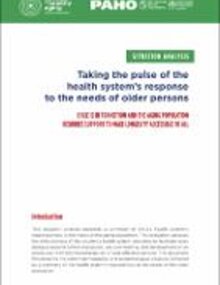This situational analysis aims to present a summary of Chile’s health system's responsiveness to the needs of its aging population. This evaluation assesses the effectiveness of the country’s health system through available tracer indicators and aims to facilitate an open dialogue towards further evaluation, decision-making, and the development of an action plan with the implementation of cost-effective policies. Chile is among the 10 countries in the Region of the Americas with the largest population of older people. According to the last census in 2017, the country has 2 850 171 people over the age of 60, corresponding to 16.5% of the country's population. By 2030 this figure is estimated to be 22.4% and in 2100 is projected to reach 36.6%. Population aging in Chile has progressed faster than in other high-income countries, increasing from 8% in 1980 to 16.5% in 2017. The average Global Fertility Rate (GFR) was 1.44 infants in 2019, below the estimated generational replacement level of 2.1 children per woman. In 2018, for every 100 people under the age of 15 years, there were on average 55 people over the age of 65 years. It is estimated that in 2023 there will be more people over the age of 60 than children (0–14 years), and by 2032 the over 65 population will outnumber children This situation represents a challenge to the health system and the requirement of adaptation and design of adequate health responses. The Decade of Healthy Aging (2021-2030) encourages countries to adopt the necessary actions to face this situation and to produce data and investigations to inform public policy decisions. In this sense, this document first presents Chile’s current demographic and epidemiological situation, followed by the main summary of its health system responsiveness, based on the model of health systems monitoring proposed by PAHO to achieve universal care.
|

